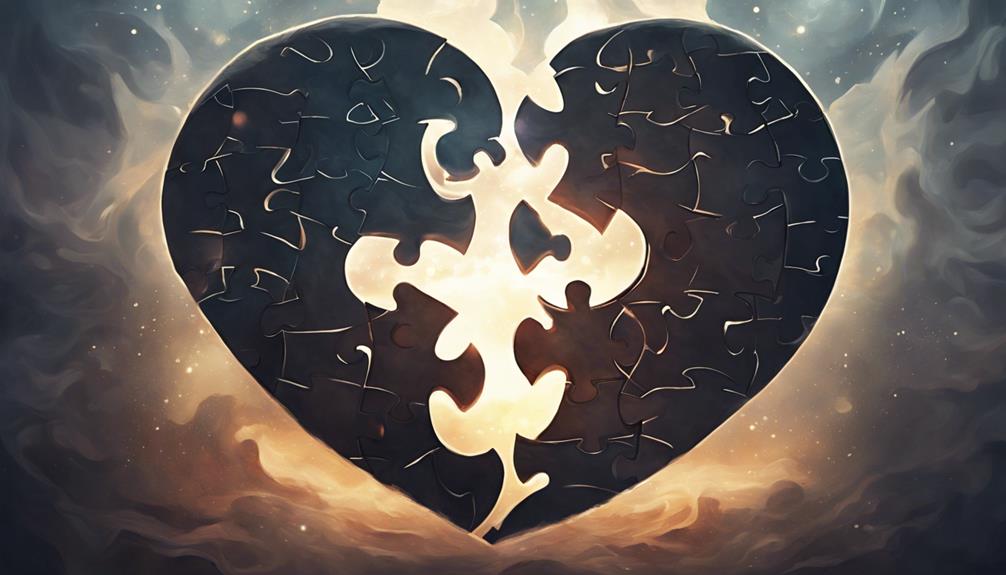Imagine you’re drawn to someone who exudes confidence and charm, only to realize they’re a narcissist. You might wonder why empaths, known for their sensitivity and intuition, often find themselves in relationships with narcissists. It’s not just about the allure of confidence or a desire to heal. Factors such as emotional manipulation, the rescue fantasy, and a cycle of reinforcement play significant roles. As we explore these dynamics, you’ll start to see how the empath’s compassion and the narcissist’s charisma create a complex interplay. Stick around to uncover the intricate reasons behind this paradoxical attraction.
The Healing Impulse

Empaths often feel a strong urge to heal those around them, especially those they perceive as emotionally wounded or vulnerable. You’re drawn to the deep layers of complexity in others, believing that your understanding and compassion can make a difference. This natural inclination leads you towards individuals who seem to need the most care, sometimes without realizing that this can put you at risk of forming relationships with those who might exploit your empathy.
Your sensitivity to emotions means you’re quick to pick up on the pain of others, and you’ve got a built-in desire to alleviate that pain. It’s not just about helping; it’s about feeling a deep connection to the emotional experiences of those around you. You believe in the power of healing and transformation, often putting the needs of others before your own.
However, this admirable trait also makes you vulnerable. You may find yourself giving more than you’re receiving, trapped in a cycle of trying to “fix” someone who may not want to be fixed or who takes advantage of your generosity. It’s important to remember that while your compassion is a gift, it’s equally crucial to protect your energy and set boundaries to ensure reciprocal and healthy relationships.
Attraction to Confidence
Drawn to the allure of self-assurance, you may find yourself gravitating towards those who exude confidence, often mistaking it for emotional stability and strength. It’s not uncommon for you, as an empath, to be attracted to individuals who present themselves with certainty and assertiveness. The magnetic pull towards people who seem to know exactly who they are and what they want can be incredibly strong.
This attraction is not just about the surface-level charm. Deep down, you may perceive this confidence as a sign of someone capable of handling life’s challenges with grace. It’s easy to assume that these individuals can provide the emotional support and security you yearn for. However, this initial attraction can sometimes blind you to underlying personality traits that are less compatible with your empathetic nature.
You’re naturally inclined to seek connections that feel meaningful and profound. The confidence of a narcissist, at first glance, seems to promise just that—a partner who is not only self-assured but also potentially a match for your depth of feeling and compassion. Yet, the reality of these dynamics can often diverge from initial expectations, leading you into complex and challenging relational territories.
Complementary Needs

While your attraction to confidence might initially draw you towards certain individuals, it’s the complementary needs between empaths and narcissists that often cement these relationships. Empaths, with their natural inclination to heal and support, find a seemingly perfect counterpart in narcissists, who often seek attention and admiration. This dynamic, while seemingly harmonious at first, is built on a foundation where both parties fulfill the other’s emotional voids in a way that feels mutually beneficial.
- Empaths offer endless compassion and understanding, qualities that narcissists crave but rarely reciprocate.
- Narcissists provide the excitement and assertiveness that empaths, who might sometimes shy away from confrontation, find attractive and even stabilizing.
- A sense of purpose is found in trying to ‘fix’ or ‘heal’ the narcissist, which appeals deeply to the empath’s inner healer.
This relationship, fueled by the complementary needs of both parties, often starts with what feels like a deep, soulful connection. Empaths are drawn to the challenge and the depth they perceive in the narcissist, mistaking the intensity for a profound emotional bond, while narcissists enjoy the constant supply of attention and emotional labor.
Emotional Manipulation
In the context of these relationships, emotional manipulation often becomes a tool for narcissists to maintain control and keep empaths deeply invested. As an empath, you might find yourself constantly trying to meet the emotional needs of your narcissistic partner, often at the expense of your own well-being. Narcissists are adept at playing the victim or leveraging guilt to ensure you remain committed and attentive to their demands.
You’re likely to experience a roller coaster of emotions, where your feelings are invalidated, and your empathy is exploited. Narcissists can twist situations to make it seem like you’re always at fault, leading you to doubt your perceptions and reality. This tactic, known as gaslighting, is a form of emotional manipulation that can erode your self-confidence and independence.
Moreover, narcissists often employ love bombing, showering you with affection and attention early in the relationship to hook you emotionally. Once they’ve secured your devotion, they withdraw this affection, leaving you yearning for the initial closeness and more susceptible to manipulation. This push-and-pull dynamic is designed to keep you off-balance and perpetually seeking their approval and love, further entrenching the cycle of emotional manipulation.
The Rescue Fantasy

Empaths often harbor a rescue fantasy, believing they can change their narcissistic partner’s behavior through love and care. You might see yourself as the one person who truly understands and can heal the wounds of your narcissistic partner. This belief is not only compelling but also deeply rooted in a desire to help and make a difference. However, this fantasy can lead you into a cycle of disappointment and emotional drain, as the patterns of narcissism are complex and not easily changed by external factors.
To keep you engaged and informed, consider these key points:
- Empaths are naturally giving: You’re wired to give love, often more than you receive, making you a prime candidate for the rescue fantasy.
- Narcissists can seem vulnerable: Their moments of vulnerability or perceived openness may reinforce your belief that you can be their savior.
- The fantasy is a trap: It keeps you tied to a relationship dynamic that is ultimately harmful, making it hard to recognize when it’s time to step away.
Understanding the rescue fantasy is crucial. It’s not just about love; it’s about recognizing when your desire to help is actually hindering your own well-being.
Empathic Overstimulation
Navigating the emotional landscape of a relationship with a narcissist, you may find yourself overwhelmed by empathic overstimulation. Your innate ability to feel deeply and absorb emotions can turn into a double-edged sword. You’re constantly bombarded with the narcissist’s emotional needs, often neglecting your own in the process. This relentless emotional input can lead to exhaustion, anxiety, and even a sense of losing your own identity.
You’re always on high alert, trying to anticipate the narcissist’s needs or mood swings, which amplifies your empathic overstimulation. It’s like you’re tuned into a radio station that’s always on, with no off switch in sight. This continuous overstimulation doesn’t just wear you down physically; it drains you emotionally, leaving you feeling empty and disconnected from yourself.
Moreover, the constant emotional turmoil prevents you from setting healthy boundaries. You might struggle to differentiate between your emotions and those of the narcissist, making it harder to protect your emotional well-being. Without clear boundaries, you’re more susceptible to remaining in a cycle of overstimulation, struggling to find a way out.
The Narcissist’s Charm

Despite the overwhelming emotional challenges, you can’t ignore the narcissist’s initial charm that often draws empaths into their orbit. This allure is not accidental; it’s a calculated display designed to captivate and enchant. Narcissists are adept at presenting themselves as the perfect partner, friend, or ally, especially in the beginning stages of a relationship. Their charm is a powerful tool, making it difficult to resist or question their intentions.
Consider these aspects of the narcissist’s charm:
- Intense Flattery: They shower you with compliments and admiration, making you feel seen and valued like never before.
- Mirroring Your Interests: Narcissists are skilled at picking up on your likes and dislikes, often mirroring your preferences to create an illusion of compatibility.
- Grand Gestures: They’re known for making grand, romantic gestures or promises to sweep you off your feet and secure your affection.
This charm offensive is a strategic move, aiming to create a strong emotional bond quickly. But it’s essential to remember, this intensity isn’t about a genuine connection; it’s about establishing control. The charm phase is temporary, a means to an end, and recognizing it as such can help you navigate the complexities of such relationships with greater awareness.
Cycle of Reinforcement
The cycle of reinforcement in a narcissist-empath relationship often starts with the narcissist’s strategic use of affection and attention to keep you hooked. Initially, they shower you with compliments and acts of love, which feels incredibly rewarding. You’re drawn in, believing this is the real deal. However, this phase doesn’t last. Once they’ve got your attention, the narcissist begins to withdraw these rewards, creating an unpredictable pattern of affection that leaves you craving their approval and attention.
You find yourself in a loop, constantly trying to regain the affection you once freely received. This intermittent reinforcement strengthens your emotional bond to the narcissist, making it difficult for you to leave the relationship. You start to believe that if you can just figure out the right way to be, you can get back to the ‘good times’. But the goalposts keep moving, and the cycle continues.
This pattern is akin to gambling; the unpredictable rewards are highly addictive. You’re left always hoping for a win, which, in this context, is the return of the narcissist’s affection. Unfortunately, this cycle is hard to break, trapping you in a relationship that’s both unsatisfying and emotionally damaging.
Conclusion
You’ve seen why empaths and narcissists often end up together, from your healing impulse to the allure of their confidence. The dance of complementary needs and emotional manipulation keeps you hooked, while the rescue fantasy and empathic overstimulation blur the lines of reality. The narcissist’s charm is hard to resist, and the cycle of reinforcement keeps you coming back for more. Remember, understanding these dynamics is your first step towards healthier relationships and self-awareness.




